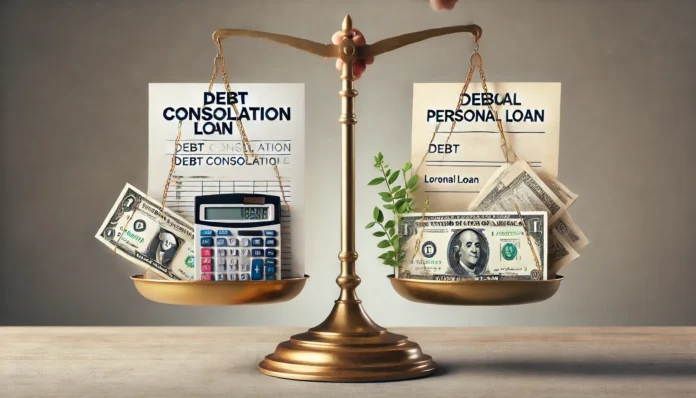Understanding Debt Consolidation and Personal Loans
Debt is a reality for millions of individuals, whether it stems from credit cards, student loans, or personal borrowing. Managing multiple debts can be challenging, especially when high-interest rates make it difficult to keep up with monthly payments. Two common solutions to alleviate this financial burden are debt consolidation loans and personal loans. While both options serve the purpose of streamlining debt payments, their structures, benefits, and eligibility requirements differ significantly. Understanding the differences between a consolidation loan vs. personal loan can help borrowers make an informed decision about which path best suits their financial needs.
You may also like: Federal Direct Consolidation Loan: A Smart Strategy to Simplify Student Debt
A debt consolidation loan is specifically designed to combine multiple debts into one, ideally at a lower interest rate. The primary goal is to simplify financial obligations by rolling all outstanding balances into a single loan, reducing the complexity of managing multiple payments and helping borrowers pay off their debts more efficiently. On the other hand, a personal loan is a more flexible financial product that can be used for various purposes, including debt repayment, home improvement, or emergency expenses. While it can be used for debt consolidation, its terms and structure may differ from a traditional consolidation loan.
Understanding debt consolidation vs. personal loan options requires a deep dive into the advantages, disadvantages, and financial implications of each. Choosing between these two options depends on factors such as credit score, interest rates, loan terms, and individual financial goals. By carefully evaluating these considerations, borrowers can determine which is better—a personal loan or debt consolidation—based on their unique financial situation.

Key Differences Between a Debt Consolidation Loan and a Personal Loan
While both financial products can help manage debt, their fundamental differences lie in their intended use, structure, and eligibility criteria. A debt consolidation loan is specifically structured to help borrowers streamline their debt payments by rolling multiple balances into a single loan. These loans often come with fixed interest rates, extended repayment terms, and structured payment plans that make it easier for individuals to manage their financial obligations.
Personal loans, on the other hand, offer greater flexibility. Borrowers can use them for various financial needs beyond debt repayment, such as medical bills, home renovations, or large purchases. Because of this flexibility, personal loans may not always provide the same favorable terms as debt consolidation loans. Interest rates can vary significantly based on the borrower’s credit score, and some personal loans may have higher fees or shorter repayment terms compared to traditional consolidation loans.
One key consideration when comparing debt consolidation loan vs. personal loan options is the eligibility criteria. Debt consolidation loans are often available to borrowers with a history of responsible credit management, as lenders seek to mitigate risk by offering favorable interest rates to those with good credit. Personal loans, however, may be easier to obtain for individuals with lower credit scores, though they typically come with higher interest rates as a tradeoff.

Advantages of a Debt Consolidation Loan
One of the primary benefits of a debt consolidation loan is the potential for lower interest rates. When borrowers consolidate their debts, they often qualify for more competitive rates than those associated with credit cards or high-interest loans. This can result in significant savings over time, particularly for individuals carrying high balances on revolving credit accounts.
Another advantage is the simplification of debt management. Instead of juggling multiple payments with varying due dates, borrowers can focus on a single monthly payment, reducing the risk of missed or late payments. This structured approach can also help improve credit scores by demonstrating consistent and timely repayment.
Additionally, debt consolidation loans often offer extended repayment terms, making monthly payments more manageable. While a longer repayment period may result in more interest paid over time, it can provide relief for those struggling with high minimum payments on multiple accounts. Borrowers must weigh the benefits of lower monthly payments against the total cost of borrowing when considering this option.

Advantages of a Personal Loan for Debt Management
While personal loans may not be specifically designed for debt consolidation, they offer several benefits that make them a viable option for managing debt. One of the biggest advantages is the flexibility in how the funds are used. Unlike debt consolidation loans, which are designated for repaying existing debts, personal loans can be used for multiple financial needs beyond debt repayment.
For individuals who do not qualify for a debt consolidation loan, a personal loan may be easier to obtain. Some lenders provide personal loans to borrowers with lower credit scores, making this option more accessible for those facing financial challenges. However, it is crucial to compare interest rates and terms to ensure the loan does not lead to additional financial strain.
Another benefit of personal loans is the ability to secure fixed interest rates. Unlike credit cards, which often come with fluctuating APRs, personal loans provide predictable monthly payments, helping borrowers budget effectively. This stability can make it easier to plan for repayment without the risk of rising interest costs over time.
Which Is Better: Personal Loan or Debt Consolidation?
Determining which is better—a personal loan or debt consolidation—depends on an individual’s financial situation, creditworthiness, and long-term goals. Borrowers with high-interest credit card debt and strong credit scores may benefit from a debt consolidation loan, as it offers structured repayment and potential savings on interest. This option is particularly advantageous for those committed to becoming debt-free within a fixed timeframe.
On the other hand, borrowers who need more flexibility or who do not qualify for a debt consolidation loan may find that a personal loan provides the best alternative. While interest rates may be higher, the ability to use funds for multiple purposes and secure a loan with a lower credit score makes personal loans an appealing option for some individuals.
Ultimately, the best choice depends on careful consideration of loan terms, repayment ability, and financial objectives. Consulting with a financial advisor or researching lenders thoroughly can help borrowers make an informed decision that aligns with their financial needs.
Frequently Asked Questions (FAQ)
What is the main difference between a consolidation loan vs personal loan?
The primary difference between a consolidation loan vs personal loan lies in their intended use and structure. A consolidation loan is specifically designed to merge multiple debts into one, often with a lower interest rate to simplify repayment. In contrast, a personal loan can be used for a variety of purposes, including home improvements, medical bills, or unexpected expenses. When considering debt consolidation vs personal loan, borrowers should evaluate their financial goals—whether they need to manage multiple high-interest debts or require funds for flexible spending. Understanding these distinctions helps borrowers choose the best financial product for their needs.
Which is better: personal loan or debt consolidation loan for reducing overall debt?
Determining which is better—personal loan or debt consolidation—depends on the borrower’s financial situation and the types of debt they are managing. A debt consolidation loan is typically the better choice for those struggling with multiple high-interest debts, as it helps streamline payments and reduce interest rates. However, a personal loan may be more suitable for borrowers who need flexibility in spending rather than consolidating specific debts. Comparing debt consolidation loan vs personal loan terms, interest rates, and repayment structures can help borrowers make an informed decision. The best choice depends on financial discipline and long-term debt management goals.
How do lenders assess eligibility for a debt consolidation loan vs personal loan?
Lenders evaluate eligibility for both a debt consolidation loan vs personal loan based on factors such as credit score, income, and debt-to-income ratio. A consolidation loan may have stricter requirements because it directly impacts existing creditors, requiring a demonstration of financial stability. Personal loans, on the other hand, may have more flexible qualification standards, depending on whether they are secured or unsecured. When choosing between consolidation loan vs personal loan options, borrowers with strong credit scores are more likely to secure favorable interest rates. Understanding lender criteria can improve approval chances and lead to better loan terms.
Does a debt consolidation loan vs personal loan have better interest rates?
In most cases, a debt consolidation loan offers better interest rates than a standard personal loan, especially for borrowers with strong credit profiles. Lenders view consolidation loans as less risky because they are used to pay off existing debts rather than fund new expenses. However, borrowers with lower credit scores may find that personal loan interest rates are comparable to or even lower than consolidation loan rates. Comparing debt consolidation vs personal loan interest rates through multiple lenders is essential to securing the best deal. Borrowers should also factor in additional costs, such as origination fees, when comparing loan options.
When is a personal loan a better choice than a debt consolidation loan?
A personal loan is a better choice than a debt consolidation loan when borrowers need funds for diverse expenses beyond paying off existing debt. For example, individuals who need to cover medical bills, home renovations, or emergency expenses may find that a personal loan offers more flexibility. Additionally, those with a good credit score may qualify for competitive interest rates that make personal loans a cost-effective option. Comparing debt consolidation vs personal loan structures helps borrowers determine the best financial solution for their needs. Choosing the right loan depends on individual financial goals and repayment capabilities.
How do repayment terms compare between a debt consolidation loan vs personal loan?
Repayment terms for a debt consolidation loan vs personal loan vary based on the lender and borrower’s financial standing. Debt consolidation loans typically offer longer repayment terms to make monthly payments more manageable, while personal loans may have shorter repayment periods. Longer repayment terms can reduce monthly payments but may lead to higher total interest paid over time. Borrowers should weigh whether they prioritize lower monthly payments or a faster debt payoff when deciding between a consolidation loan vs personal loan. Understanding the long-term cost implications ensures a financially sound decision.
Can using a personal loan for debt consolidation be a good idea?
Using a personal loan for debt consolidation can be a good idea for borrowers who do not qualify for a dedicated consolidation loan. If a borrower finds a personal loan with lower interest rates than their current debts, it can still serve as an effective debt management strategy. However, personal loans may lack the specialized repayment structures that debt consolidation loans provide. Comparing debt consolidation loan vs personal loan features, such as repayment flexibility and fees, helps determine which option best aligns with financial goals. Careful financial planning ensures that consolidation efforts lead to long-term stability.
Which is better: personal loan or debt consolidation loan for improving credit scores?
Deciding which is better—personal loan or debt consolidation loan—for improving credit depends on how the funds are used and repaid. A debt consolidation loan can positively impact credit scores by reducing credit utilization and simplifying payments. On the other hand, a personal loan used irresponsibly may increase overall debt, potentially harming credit scores. Making consistent, on-time payments is key to leveraging either loan type for credit improvement. Evaluating debt consolidation vs personal loan effects on credit health ensures borrowers choose the most beneficial approach.
How does loan approval time differ between a debt consolidation loan vs personal loan?
Approval times for a debt consolidation loan vs personal loan vary depending on the lender and borrower’s credit profile. Personal loans, especially those from online lenders, often have faster approval processes, with funds available within a few days. Debt consolidation loans may take longer as lenders assess existing debts and coordinate payments with creditors. Borrowers who need immediate funds may find a personal loan more convenient, while those prioritizing structured debt repayment may opt for a consolidation loan. Understanding approval timelines helps borrowers choose the loan that aligns with their urgency and financial situation.
What factors should borrowers consider when choosing between a consolidation loan vs personal loan?
When choosing between a consolidation loan vs personal loan, borrowers should consider interest rates, repayment terms, eligibility requirements, and overall financial goals. Debt consolidation loans are best suited for managing multiple high-interest debts, while personal loans provide flexibility for various expenses. Those asking, “Which is better personal loan or debt consolidation?” should assess their ability to meet monthly payments and avoid future debt accumulation. Additionally, comparing lender reviews, fees, and customer service can help in selecting the right loan. Making an informed choice ensures financial stability and effective debt management.
Conclusion: Making an Informed Decision on Debt Management
Choosing between a debt consolidation loan vs. personal loan requires an in-depth understanding of each option’s benefits, risks, and financial implications. Debt consolidation loans provide structured repayment and potential interest savings, making them an excellent choice for individuals seeking to streamline their debt payments. Personal loans, while offering greater flexibility, may come with higher interest rates but serve as an alternative for borrowers who do not qualify for consolidation loans.
Financial stability is achieved through strategic decision-making, and selecting the right debt management tool is a crucial step in this process. By analyzing interest rates, repayment terms, and overall financial goals, borrowers can determine which option—personal loan or debt consolidation—best suits their needs. Regardless of the choice, committing to responsible borrowing and consistent repayment ensures a more secure financial future.
financial planning, debt relief options, personal finance strategies, debt repayment solutions, managing debt efficiently, loan comparison, improving credit scores, responsible borrowing, financial wellness, budgeting tips, interest rate analysis, choosing the right loan, long-term financial stability, personal loan benefits, debt reduction techniques, structured repayment plans, consolidating credit card debt, financial literacy, best loan options, debt elimination strategies
Further Reading:
Personal Loans for Debt Consolidation
Move forward with a debt consolidation loan from Discover®
The information provided in this article is for general informational purposes only and is not intended to constitute financial, investment, legal, tax, or other professional advice. The content should not be relied upon for making any financial or investment decisions. Readers are encouraged to consult with licensed professionals, such as financial advisors, attorneys, or tax experts, to obtain personalized advice tailored to their individual circumstances. The author and publisher disclaim any liability for any actions taken or not taken based on the information provided in this article.





